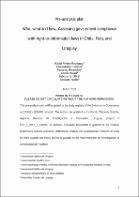JavaScript is disabled for your browser. Some features of this site may not work without it.
Who, what and how: Assessing government compliance with right-to-information laws in Chile, Peru, and Uruguay [pre-analysis plan]
Fecha
2021-05Autor
Piñeiro, Rafael
Muñoz, Paula
Rosenblatt, Fernando
Rossel, Cecilia
Scrollini, Fabrizio
Tealde, Emiliano
Metadatos
Mostrar el registro completo del ítemResumen
This project analyzes the conditions that promote compliance with right-to-information (RTI) laws in three Latin American countries (Chile, Peru and Uruguay). We conduct a field experiment to understand how the status of the requester (who), the content of the request (what) and the way the request is presented (how) influences governments’ response in these three countries. We test whether these three governments’ responsiveness to RTI requests depends on the requester’s public status as a known journalist, the political sensitivity of the request and the level of formality characterizing the request. In contexts of low compliance, bureaucrats and politicians assess reputational and political costs at the time of deciding whether or not to comply with an RTI request. The assessment of both types of cost depends on the combination of what information is requested, who requests it, and how the information is requested. The characteristics of the person who requests the information and how they request it mediate the final assessment of the reputational and political costs associated with the content—the “what”—of the request. Carrying out the same experiment with variations across our three countries of interest increases the external validity of our conclusions and yields a better understanding of cross-country differences.
Colecciones
- Artículos [52]


